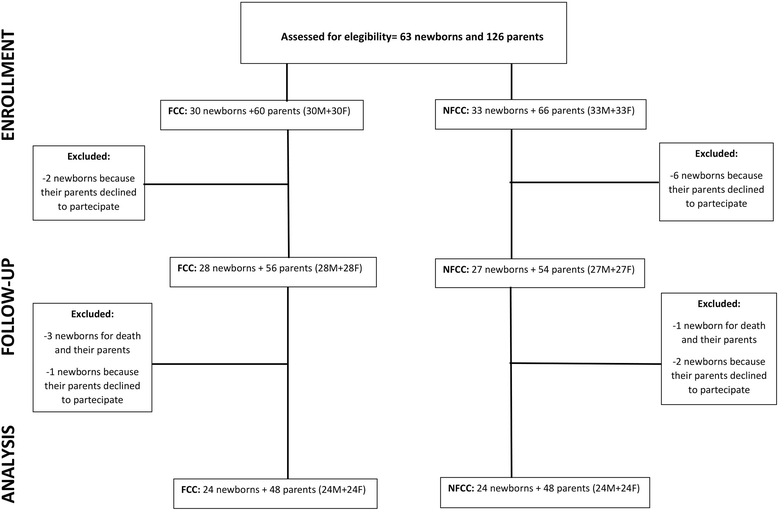Supporting parents in taking care of their infants admitted to a neonatal intensive care unit: a prospective cohort pilot study
- PMID: 28412958
- PMCID: PMC5392981
- DOI: 10.1186/s13052-017-0352-1
Supporting parents in taking care of their infants admitted to a neonatal intensive care unit: a prospective cohort pilot study
Abstract
Background: Family-Centred Care (FCC) is recognized as an important component of all paediatric care, including neonatal care, although practical clinical guidelines to support this care model are still needed in Italy. The characteristics and services for families in Italian NICUs show a lack of organization and participation.
Methods: The first aim was to compare satisfaction and stress levels in two groups of parents: an FCC group and a non-FCC group (NFCC). The second aim was to evaluate body weight gain in the newborns enrolled. This non-randomized, prospective cohort pilot study was conducted in a single level III NICU at a hospital in Naples, Italy. A cohort of newborns in the NICU, with their parents were enrolled between March 2014 and April 2015 and they were divided into two groups: the FCC group (enrolled between October 2014 and April 2015) remained in the NICU for 8 h a day with FCC model; the NFCC group (enrolled between March 2014 and September 2014) was granted access to the NICU for only 1 hour per day. At discharge, both parent groups completed the Parental Stressor Scale (PSS)-NICU and a questionnaire to assess their satisfaction. In addition, we compared scores from the mothers and fathers within and between groups and the body weights of the newborns in the two groups at 60 days.
Results: Parents participating in the FCC group were more satisfied and less stressed than those in the NFCC group. Infants in the FCC group also showed increased body weight after 60 days of hospital stay.
Conclusions: Despite our small population, we confirm that routine adoption of a procedure designed to apply a FCC model can contribute to improving satisfaction and distress among preterm infants' parents. Future multi-centre, randomized, controlled trials are needed to confirm these findings.
Keywords: Family care; Newborn; Parental stress level.
Figures
Similar articles
-
Parents' experiences of transition when their infants are discharged from the Neonatal Intensive Care Unit: a systematic review protocol.JBI Database System Rev Implement Rep. 2015 Oct;13(10):123-32. doi: 10.11124/jbisrir-2015-2287. JBI Database System Rev Implement Rep. 2015. PMID: 26571288
-
Multidimensional assessment of infant, parent and staff outcomes during a family centered care enhancement project in a tertiary neonatal intensive care unit: study protocol of a longitudinal cohort study.BMC Pediatr. 2023 Jul 7;23(1):344. doi: 10.1186/s12887-023-04165-0. BMC Pediatr. 2023. PMID: 37420180 Free PMC article.
-
Improving Care in Neonatal Intensive Units During the COVID-19 Pandemic: A Survey on Electronic Health Communication.J Intensive Care Med. 2022 May;37(5):671-678. doi: 10.1177/08850666211055058. Epub 2021 Nov 17. J Intensive Care Med. 2022. PMID: 34789020
-
Effects of family-centred care interventions on preterm infants and parents in neonatal intensive care units: A systematic review and meta-analysis of randomised controlled trials.Aust Crit Care. 2019 Jan;32(1):63-75. doi: 10.1016/j.aucc.2018.10.007. Epub 2018 Dec 13. Aust Crit Care. 2019. PMID: 30554939
-
Improving Neonatal Intensive Care Unit Quality and Safety with Family-Centered Care.Clin Perinatol. 2023 Jun;50(2):449-472. doi: 10.1016/j.clp.2023.01.007. Epub 2023 Mar 21. Clin Perinatol. 2023. PMID: 37201991 Review.
Cited by
-
Investigating Father or Partner Involvement in Family Integrated Care in Neonatal Units: Protocol for a Prospective, Multicenter, Multiphase Study.JMIR Res Protoc. 2024 Mar 25;13:e53160. doi: 10.2196/53160. JMIR Res Protoc. 2024. PMID: 38526549 Free PMC article.
-
Mothers' involvement in providing care for their hospitalised sick newborns in Kenya: a focused ethnographic account.BMC Pregnancy Childbirth. 2023 May 26;23(1):389. doi: 10.1186/s12884-023-05686-3. BMC Pregnancy Childbirth. 2023. PMID: 37237328 Free PMC article.
-
Parental satisfaction with neonatal intensive care units: a quantitative cross-sectional study.BMC Health Serv Res. 2019 Jan 15;19(1):37. doi: 10.1186/s12913-018-3854-7. BMC Health Serv Res. 2019. PMID: 30646901 Free PMC article.
-
Differences in parental stress in mothers and fathers of preterm infants: A prospective study in Poland.Eur J Midwifery. 2025 Mar 7;9. doi: 10.18332/ejm/200552. eCollection 2025. Eur J Midwifery. 2025. PMID: 40061453 Free PMC article.
-
Stress and feelings in mothers and fathers in NICU: identifying risk factors for early interventions.Prim Health Care Res Dev. 2019 Jun 7;20:e81. doi: 10.1017/S1463423619000021. Prim Health Care Res Dev. 2019. PMID: 32799977 Free PMC article.
References
-
- Als H. A synactive model of neonatal behavioral organization: Framework for the assessment and support of the neurobehavioral development of the premature infant and his parents in the environment of the neonatal intensive care unit. In: Sweeney JK, editor. The highrisk neonate: Developmental therapy perspectives”. Physical and Occupational Therapy in Pediatrics. 1986. pp. 3–53.
Publication types
MeSH terms
LinkOut - more resources
Full Text Sources
Other Literature Sources
Medical
Miscellaneous


